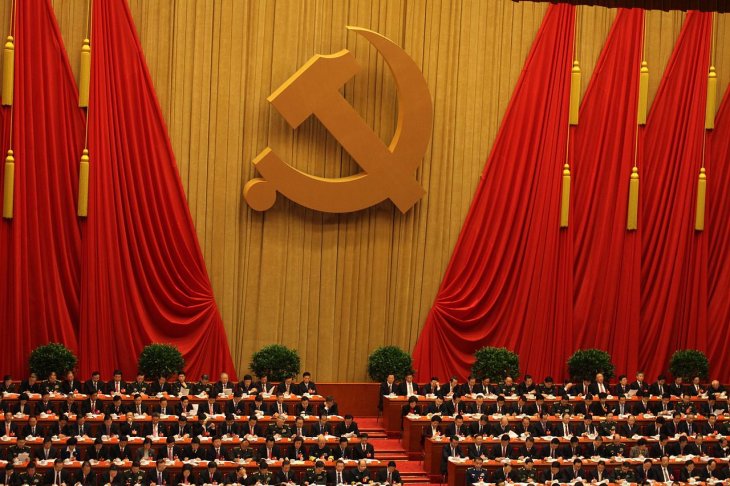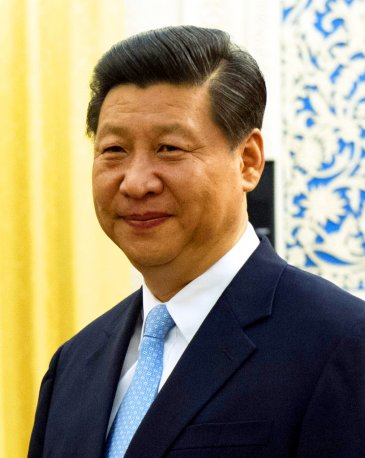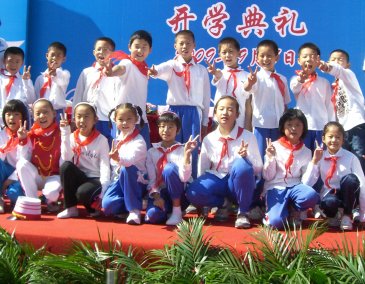The only drama in the “two sessions” jamboree in Beijing this spring is that there was no drama at all. Each year the Chinese political élite, 5000 men and a few women strong, congregate in the capital for a week of meetings of the legislature, the National People’s Congress, and its advisory body, the Chinese People’s Political Consultative Conference. This year the choreography was faultless. Even reporters who were assigned to provide their editors at least some copy, could find next to nothing to write about. In Beijing, all is steady and all is under control.

18th National Congress of the Communist Party of China. Photo: Wikimedia Commons
The gathering was the dress rehearsal for the upcoming Communist Party’s National Congress in a few days, the once every five year event where real power is at play. We can expect that meeting to be equally orchestrated with no irregularities to suggest confusion in the leadership. The “core” leader, Xi Jinping (as he is now officially designated), will be anointed for another five years, more of his cronies will take positions in the leadership reshuffle, and ways will be found for his ally, Wang Qishan, now in charge of Party discipline and anti-corruption, to stay on in a top post although he by age-rules should be obliged to retire. Again, there will be no drama.
So what is the nature of the regime that holds the grip on national politics that no ripples are allowed to disturb the harmony? We know enough to give a reasonably clear answer to that question, although there are also remaining unknowns on which we can only speculate.
When Xi Jinping came to power in 2012, the almost universal expectation was that he would be the dynamic moderniser to reform the economy off its dependency on state driven debt-infused over-investment. But that hope has been confounded. Xi’s priority has been political restitution. In his first five years he has reshaped the Chinese state so radically that he has taken the People’s Republic into the third phase in its historic march, after the ideological madness of Mao and the economic pragmatism of Deng Xiaoping and his followers.
He has acted with great determination but also shrewdness, working steadily step-by-step and drip-by-drip, never allowing the boat to rock out of balance. By the time the Party meets itself in October, he will have changed the facts on the ground in two ways.
- First, there has been a relentless concentration of power, in the country to Beijing, in Beijing to the Party and in the Party to the boss himself.
- Second, there has been an equally relentless tightening of repression, followed by intensification of Party discipline, political education, mass campaigns, propaganda, thought-work, and crack-downs on political, ethnic and religious activists.
Ideology is back with a vengeance, in Xi Jinping’s narrative of national greatness in his slogan of “the China Dream.”

Xi Jinping. Photo: Erin A. Kirk-Cuomo. Wikimedia Commons
Xi is the most powerful leader since Mao, not quite taking the system back to one-man rule but leaning it in that direction. On coming to power, he immediately occupied all decisive leadership posts, including the chairmanship of the Central Military Commission, and soon created new “leading groups” with himself as chair, such as for national and internet security. Deviants, real or imagined, from outside of his own circle have been purged in the anti-corruption campaign. He has cloaked himself in an aura of person cult, being hailed for exceptional virtue and dedication throughout the state-controlled media.
It is now enough for him to stand before the faithful, immaculate in dress and demeanour, a mild smile generously on the ready, not a straw of hair out of place in his jet-black coif, his little pot-belly just right, not big so as to suggest indulgence but enough to make him fatherly, to be rewarded with waves of adulation. This year’s report by the premier, Li Keqiang, to the National People’s Congress was extraordinary for its lavish praise on the Party and its leader, culminating in a pledge for all to “rally ever closer around the Party Central Committee with comrade Xi Jinping at its core.”
Controls and repressions have narrowed the space for human rights lawyers to protect the persecuted, think-tanks and NGO’s to operate independently, journalists to report honestly, feminists to advance their causes, academics and teachers to instruct and research objectively, the religious to worship freely. Authors and artists have been told, in an echo of Stalinism, that their work must “serve the people.”
Censorship is ever tighter in literature and media. Contrary to expectations, the internet has not become a lever for opening up from below but rather another instrument of control from above.
The Chinese dictatorship is like nothing the world has ever known, so smooth that it in some respects does not even look dictatorial, relying extensively on people’s self-control. But also brute and raw where needs be. The western provinces, Tibet and Xinjiang, have been turned into garrison states. Most Chinese now have many freedoms in their daily lives which no one interferes with, as long as they do not take their freedoms into the domain of Party affairs or to organising outside of the Party apparatus. It is of a new kind, controlling everything but not dictating what does not need to be dictated. I call it a “controlocracy.”

School children are taught to love the Party. Photo: Wikimedia Commons
The regime is equally sophisticated in propaganda. There is much of old-fashioned boasting by the regime, but the real work is done more softly. School children are taught to love the Party but the more effective influence is through careful editing of teaching material in history and other subjects to promote the national truth. Two million “internet opinion analysts” are on the job not only of keeping undesirable material outside of the “great firewall” but also shaping what goes in, which is done subtly so that even much of the criticism that circulates on the web, appearing to be from private citizens, is under control to be of the right kind.
The concentration of power and the tightening of dictatorial controls we know enough about to present as fact. It is also logical. The party-state needs legitimacy. The state has its legitimacy from the Party, but the Party needs to get it from somewhere else. Since Deng’s reform and opening up, it has relied extensively on economic growth and the spreading of rewards in the population. Now, with expectations inflated, mega-growth is over. The leaders know the danger. They can rely less on their ability to purchase the people’s gratitude. Always weary of their grip on power, they turn, pre-emptively, to tighter controls and nationalistic ideology.
Xi’s China Dream, now omnipresent wherever the Party and its affiliates speak, is more than the usual slogan of hot air. The Party that claims the right to control everything must be able to justify itself. Revolution has no traction in a keptocracy in which officials enrich themselves by looting the state and income inequality is more extreme than in most capitalist countries. The available narrative is that of national glory.
What we do not know is just who Xi Jinping is and where he will take the party-state in his next five years (at least) in the lead. Here, we enter the realm of speculation, but nevertheless with some evidence to build on.
One view, by some of his friendlier observers, is that Xi is in fact the hoped for moderniser, that he has used his first years to consolidate power, and that he in his next period will take that power to the job of reforming the economy. Perhaps so – but this is more likely hope over experience. Xi laid out an ambitious agenda of economic reform early on, in the “third plenum” in 2013. (A “plenum” is a meeting of the Party’s Central Committee, about 370 members, usually twice a year.) But not much has been followed up. That is not for want of power. Had reform been a priority, it would long since have been rolled out. It must be safer to speculate from what the leader has in fact done than out of theoretical hope.
The Chinese system is extraordinarily dependent on the leadership, and now on the leader himself. It therefore matters for our understanding of that system what kind of man Xi is, what he thinks, what he believes, what his values are.
We of course cannot know, but for my part I am coming around, hesitantly, to thinking of Xi Jinping as a true believer. He looks to me like a man who really believes in his mission, in the reds aristocracy’s right and duty to rule, and in the purity of the Communist Party.
The imperative is to secure the perpetuation of the Party regime. Xi sees himself as the man who can impose the necessary discipline within the Party and controls throughout society to avoid Soviet-style disintegration. For him and other “princelings” (the children and grandchildren of revolutionary and early PRC grandees), the people are children who need the intimate guidance of their betters. He and his fellow aristocrats allow them the prospect of having property and possibly getting rich, but demand their loyalty. To that end, they control media, information and history. They take propaganda and thought-work very seriously. They use the anti-corruption campaign to make people believe the party-state is being cleaned up. (A remarkable propagandistic skill of the regime is to have itself given credit for allowing people to extricate themselves from the miseries it has itself imposed on them.) As other exposed leaders, they turn to nationalism and co-opt good people into a nasty fairy tale of “national rejuvenation.”
Is this a regime that is able not only to control people’s behaviour but also their minds? Chinese people are not more gullible than others but are more than others subjected to aggressive thought-work from above. When I speak about China in Europe and the US, I can count on a young Chinese in the audience to tell me that his/her parents at home tell him/her that they are happy in their new-found affluence party-state order. Perhaps they are. But then the young Chinese abroad are not from the peasant population, whose young are the internal migrants who fuel the state’s investment machine with cheap labour, and whom visitors, if they put on sun glasses so as not to be blinded by shine from the skyscrapers, will see as the wretched of the earth slaving away in the city gutters, and whose children again are not in comfort abroad but in sub-standard schools at home, an estimated 60 million of them “left-behinds” in the countryside.
If it is possible that the dictators are making the people believers, could it be that they are persuading themselves likewise? Why not? The top brass live elevated lives in their Zhongnonhai enclosed compound, with their own protected food supply and behind the safety of air filtering systems. The state may be a kleptocracy, but it is not more farfetched that those who float on the top there see themselves as righteous than that, for example, European nineteenth century aristocrats, who sat on societies rotten with corruption and vice, saw themselves as the custodians of ordained orders of virtue. If the mission is now national greatness, the Party is again the instrument of a noble cause. If they are cleaning up the corruption, are they not reviving classical values, austerity and honesty? People who tell stories, and repeat them and have them repeated back, are exposed to believing what they say and hear.
What then for the regime in Xi’s next period?
In five years he has reshaped both its practice and its narrative. On the continuum from mild autocracy to all-out totalitarianism, he has shifted in the totalitarian direction. Is that now enough or will the shift continue?
A prudent Xi would rest on his laurels, be content with the control he has obtained and consolidate by continuing his various moral crusades. But he has brewed for himself a dangerous cocktail of one-man rule (near to), ideology, propaganda and though-work. When has any leader, dizzy with power and success, able to bend history, experiencing love and admiration, been able to say to himself: enough?
The economic miracle is over and China is getting stuck in the middle-income trap. The socialist market economy’s many problems and contradictions can no longer be smoothed over by having money from mega-growth thrown at them. Such contentment as there may be in the population is not to be trusted. There is nowhere else for the regime to go than to controls justified by mythology. The leader who has reaped success and gratitude for his efforts, will continue. He is in control, but control is not yet total. He has said to his people that “each person’s future and destiny is linked with the future and destiny of the country and nation” (in his launch of the China Dream), but his teachings are not yet clear enough and not yet absorbed.
Critical observers tend to think that a regime with as many built-in contradictions as the People’s Republic cannot endure and that some kind of collapse is in the making. The likely scenario in my reading is different. The red aristocracy will hold on by perfecting the controlocracy, step-by-step and drip-by-drip, towards tighter controls and all-out totalitarianism. Can it thereby endure? Elsewhere (except possibly in North Korea) totalitarianism has failed. The Chinese leaders have studied those failures and are carving out their own way, not soft but smart totalitarianism. The People’s Republic has for decades survived the persistent predictions of its own demise.
- This text was first posted at Stein Ringen’s blog ThatsDemocracy.com, and is now posted in a slightly revised version at the PRIO blog in conjunction with Professor Ringen’s seminar at PRIO 25 September 2017. The seminar was recorded.